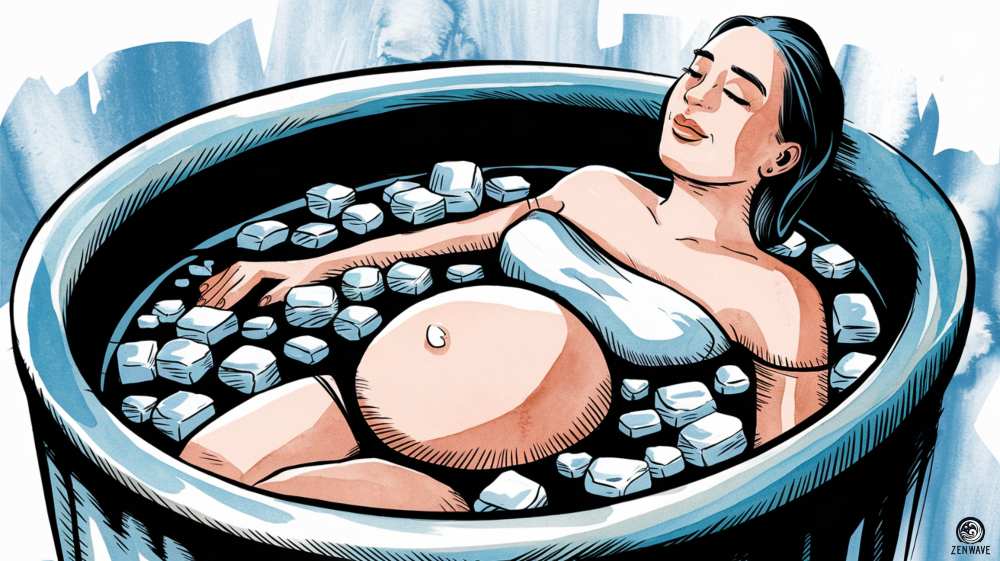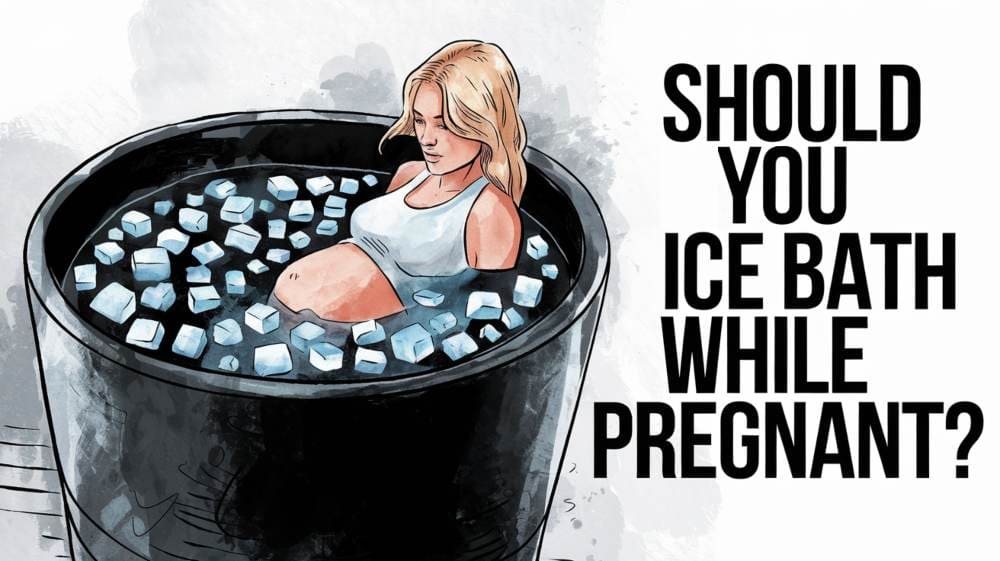An ice bath or cold plunge in involves sitting in uncomfortably cold water (50-59°F) for a few minutes at time. However, for pregnant mothers it might not always be safe to take an ice bath.
The best answer is to consult your healthcare provider first before taking ice baths while pregnant. If you do, it should not be done at extremely low temperatures. While there are potential benefits that could ease some discomforts of pregnancy, it’s important to understand potential risks before trying an ice bath while pregnant.
Some women do choose to practice cold water therapy while pregnant and have enjoyed the benefits. In this article we will look at both the potential good and sides of ice baths for pregnant women.
Benefits of Ice Baths During Pregnancy

While there isn’t much scientific research specifically on ice baths during pregnancy, there are many proven postive effects of regular cold exposure.
1. Stress Reduction
One of the most profound benefits of ice baths is acclimating the body to better handle stress. There is research on cold exposure and stress resilience that has led to researchers hypothesize that this exposure could potentially lead to a “reduction in negative birth outcomes.”
Ice baths may be particularly helpful for managing pregnancy-related stress. The quiet time during an ice bath might provide a moment for mindfulness, allowing you to focus on your breath and connect with your changing body.
2. Reduced Pain and Inflammation
Cold therapy is known to help reduce inflammation, which might help with pregnancy-related swelling in feet, ankles, and hands. The cold causes blood vessels to shrink, which can decrease fluid buildup in these areas. This could provide temporary relief from the discomfort of swelling, which is common during pregnancy, especially in the later stages.
3. Increased Energy
The shock of cold water can make you feel more awake and alert, which might help combat pregnancy fatigue. This energy boost could be especially welcome in the third trimester when many women experience increased tiredness. Some women report feeling invigorated and refreshed after an ice bath, which can be a welcome relief from the fatigue often associated with pregnancy.
4. Mood Improvement
Some people report feeling happier after an ice bath. This is likely due to the release of endorphins, your body’s natural feel-good chemicals. The mood boost could potentially help with pregnancy-related mood swings.
The sense of accomplishment after completing an ice bath might contribute to an improved mood and increased self-confidence. Ice baths can help with anxiety, and the mood-lifting effect makes may help those pregnant women dealing with prenatal depression symptoms.
5. Better Circulation
The cold of an ice bath causes blood vessels to shrink and then expand, a process that might help improve overall blood flow. Better circulation could help deliver more nutrients to your baby and might also help reduce the risk of varicose veins, which are common during pregnancy due to increased blood volume and pressure on the veins.
Check out more benefits of ice baths, to see how ice baths could potentially help during pregnancy.
Risks of Ice Baths During Pregnancy

While ice baths might offer some benefits, they also come with potential risks, especially during pregnancy. It’s crucial to understand these concerns before deciding to take the plunge:
1. Reduced Blood Flow to the Baby
This is the big one. When you hop into an ice bath, your body goes into survival mode. Blood vessels near your skin constrict to keep your core warm. This could potentially reduce blood flow to your uterus, which might limit oxygen and nutrients getting to your baby. While short periods might be okay, extended extreme cold exposure can be risky for pregnant women.
2. Core Temperature Drop
Pregnancy already affects your body’s temperature regulation. An ice bath could cause your core temperature to drop too low, too quickly. This rapid cooling might stress your body and, in extreme cases, lead to hypothermia.
3. Cardiovascular Stress
The shock of cold water can make your heart rate spike and your blood pressure rise. For most healthy adults, this isn’t a problem. But pregnancy puts extra strain on your heart already.
This could be particularly beneficial given the high levels of stress many women experience during pregnancy. However, if you have any underlying heart conditions or pregnancy-related heart issues, this sudden stress could be dangerous.
4. Slip and Fall Hazards
It might not seem like a big deal, but don’t underestimate the risk of slipping. Wet surfaces around an ice bath can be treacherous. With your center of gravity shifted due to pregnancy, you might be more prone to losing balance. A fall during pregnancy could have serious consequences for both you and your baby.
5. Infection Risk
If the water isn’t clean enough, there’s a risk of infection. Pregnancy can make you more susceptible to certain types of infections, which could potentially harm your baby. This is especially important to consider if you’re using public ice baths or natural cold water sources.
Remember, every pregnancy is unique. What might be a minor risk for one person could be a major concern for another. Always consult with your healthcare provider before trying ice baths or any new therapy during pregnancy. They can give you personalized advice based on your specific health situation and pregnancy progress.
Final Thoughts
Ice baths during pregnancy are a complex topic. While they might offer some benefits like stress relief and reduced swelling, they also come with risks. The most important thing to do is talk to your doctor before trying an ice bath while pregnant. They know your health best and can give you personal advice.
If your doctor says it’s okay, remember to be careful. Don’t have too cold of an ice bath and don’t stay in for too long. Pay attention to how you feel and stop if anything doesn’t seem right. Keep in mind that there are other safer ways to manage pregnancy discomforts. In the end, what matters most is keeping you and your baby safe and healthy.

